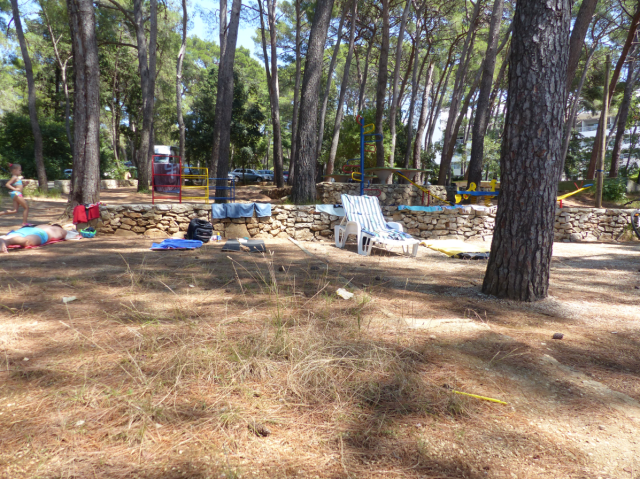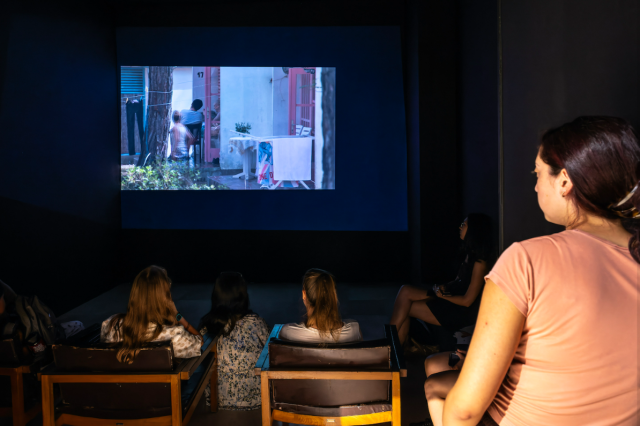Seizing, remembering and reconstructing “Free Time”
Ivana Marjanović: Ana, you have been working for a long time on the topics of wage labor, work, and recently also free time. Part of your interdisciplinary research goes back to the times of socialist Yugoslav self-management, its politics of work and resting but also the post-socialist, capitalist transformations. Coming from former Yugoslav space and post-Yugoslav context, and living in Austria, we share early memories of places on the Adriatic coast and the mountains in Yugoslavia where we spent holidays or excursions with kindergarten and school teachers and/or our families (places such as Jelsa on Hvar island, Bol on Brač island, Jakljan island, Mitrovac on Tara mountain…). We also experienced the collapse of these spaces and times, the destruction of war, the capitalist transition. Back then, going on holiday was the standard for the great majority of people, and the seaside, especially on the Croatian coast, was a favorite place to be. However, we should not be nostalgic, as these Yugoslav times were also times of certain restriction of freedom, since the communist party controlled the public space and the politics (which we also know about thanks to the critique of the left from the left). But, nowadays the standards for “working class” families are not comparable to those during socialism, not to mention for those even poorer. How do you see all this, and what are some of your reflections about free time as time for celebration?
Ana Batista: The vacation period in Yugoslavia was introduced for two reasons: Firstly, it was important to recover in order to be able to work effectively over the next months. To achieve good productivity, it was important to take time off work. It was clear that an overworked producer could not work well in the long term. The employers had a dual role in the Yugoslavian company. On the one hand, they were co-owners of the company (socialist Yugoslav self-management), on the other hand, they were workers themselves. Next to the question of production, it was important to create infrastructures for free time that were also collectively designed and allowed all employees a spot by the sea and time off by the sea. Company profits were not only shared out through wages. The life of the former bourgeoisie, which cultivated free time, was also a model for this to some extent. Many companies had their own hotels, bungalows and campsites by the sea. The Zenica steelworks had one in Neum, the Market Komerc in Makarska. The concept of paid vacation was introduced shortly after the Second World War.
Furthermore, it was important that access to the country's natural resources should be available to as many of its inhabitants as possible. Residents from different republics should meet and have the opportunity to spend time together. The Yugoslav coast was also the place where people from the Warsaw Pact and NATO Pact spent their free time. Yugoslavia was a co-founder of the Non-Aligned Movement and wanted to cooperate politically with both blocs. On the one hand, a market-oriented economy was introduced; on the other, the political goal was to create a socialist framework within the country, i.e. a social basis that would lead to equality. This meant that the infrastructural possibility of vacationing by the sea or in the mountains was also part of this idea of equal access to natural and land resources and also included the issue of collective participation. Ultimately, the opportunities were again dependent on the economic power of the company. However, what can be said with certainty is that access to natural areas and longer stays there were, on average, possible for many more inhabitants than today and certain political notions, such as free access to the sea for all, are still considered important democratic decisions. However, there are already tendencies to privatize the beaches.
Ivana: In 1994 you moved from Zenica due to the war in Bosnia and Herzegovina. You came to Germany as a teenager and later to Austria. What are your experiences in regard to the topic of “free time” and “time to celebrate” in these contexts as you were growing up and facing the challenges of migration? How have these concepts changed through time? More precisely, how do you see the question of privilege, citizenship, and class struggle, and their relation to “free time” and autonomy (we know that the heaviest forms of exploitation are further enabled by restricted access to citizenship, for instance asylum seekers or other precarious migrants who work seven days a week, often illegally and are never able to take a leave)?
Ana: During my time in Germany, I lived with a German host family. In Germany, the sea and the coast play a different role than in Yugoslavia. People traveled abroad to get to the sea (Spain, Yugoslavia, etc.). But I was once at the Baltic Sea and once at the North Sea. I really enjoyed getting to know the dune landscape. I like all the seas in the world, I think. The issue of collective ownership and free time was not so prevalent in West Germany, at least not where I was. It was clear that property was privately owned, and even the existing public goods were increasingly privatized. I think it's a bit of a pity that I wasn't in Berlin at the time. Then I would probably be able to report on it in a more differentiated way. In Germany, there was a 35 DM ticket for several people over the weekend, if I remember correctly. I traveled around a lot and actually got to know a lot of cities, museums, libraries, castles, etc.. I think I kept my curiosity alive there too. In that sense, my migration experience was characterized by a great longing, but also by an enormous interest in new things.
Ivana: While I was preparing for the exhibition “FREE TIME” that you recently curated at Kunstraum Innsbruck, a colleague recommended reading The Soul at Work: From Alienation to Autonomy, a book by Franco Berardi. In the introduction, it refers to Karl Marx’s writing about work that would become free i.e. work that will not depend on wage labor and income. This means that working would not be existential coercion, and hence people would not depend on wage labor to finance their existence. In the last years there have been discussions and experiments on basic income, for instance. The idea of this concept of the welfare state is that every citizen should receive a monthly minimum income, independent of employment status, and thus could work freely without depending on jobs to sustain their own life. Hence the work would be more productive and creative. How do you see the question of free time in the context of these post-capitalist visions of future development of work relations?
Ana: Thank you for this question. It is interesting to note that the idea that technological progress and the associated productivity would lead to a reduction in working hours was already established in the 19th century. This idea still exists today. If more machines are used in production and do the work that used to be performed by people—it is assumed that machines will be able to work much more independently—then humans will have more free time. I think that would be a good thing because people could choose their interests more freely and this could, I hope at least, lead to less hierarchy and more equality and freedom. People would still be doing something—but they wouldn't have to legitimize that doing through the output produced. That would change the perspective on the world of work considerably. I think leisure time itself would still be part of the idea, because it would be the time when you do something different than usual. This other thing would then also be located in "free time." That is, the time when you gain different experiences and experience different moods.
Ivana: I would like for us to share some “references,” some ideas from your experiences of working with art, as this is your main field of action. I read a quote by Georgia O'Keeffe a white ago. This famous American painter who is known for very delicate paintings of flowers that are often read through gender lenses said, “Nobody sees a flower - really - it is so small it takes time - we haven't time - and to see takes time, like to have a friend takes time.” (O'Keeffe in Breathnach 1999, 196) In recent decades it has become a source of pride to celebrate being busy as a sign of “success,” leaving many people and things behind. What are your thoughts and strategies for contesting these forms of alienation, what are your inspirations?
Ana: It's important to find time for shared experiences, and I think that's becoming more and more essential. We talk a lot about circumstances and conditions, which is of course substantial, we do that even with a lot of affect, but the time for shared experiences, where we meet at eye level and go into the situation together, is becoming shorter. It's also vital to have ‘free time’ during working hours. For me, this is the time when we can reflect and discuss 'freely' without emphasizing our representative roles. Free time away from work should also be characterized by exploration, celebrations, and encounters. I always enjoy being around people. I loved, for example, Wiltener Platzl in Innsbruck. It's a great place to relax, talk, and be aware of each other. These spaces not only create relationships between close friends, but also simply between people. Socially mixed places are hugely beneficial to the idea of democracy and emancipation.
LITERATURE
Sarah Ban Breathnach, 1999. Sitne radosti : Knjiga utjehe i radosti za svaki dan. Zagreb: Mozaik knjiga
Franco Berardi Bifo. 2009. The Soul at Work: From Alienation to Autonomy. South Pasadena: SEMIOTEXT(E





